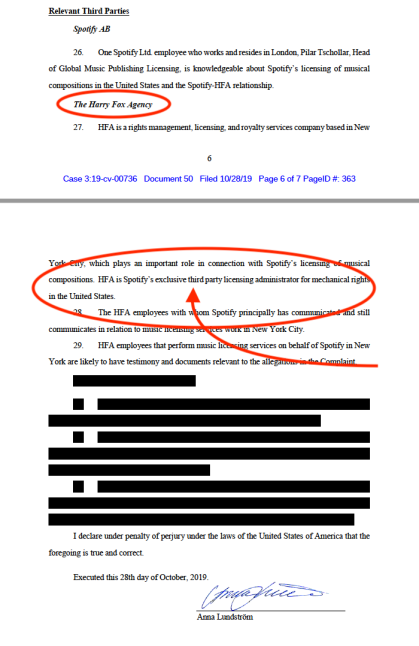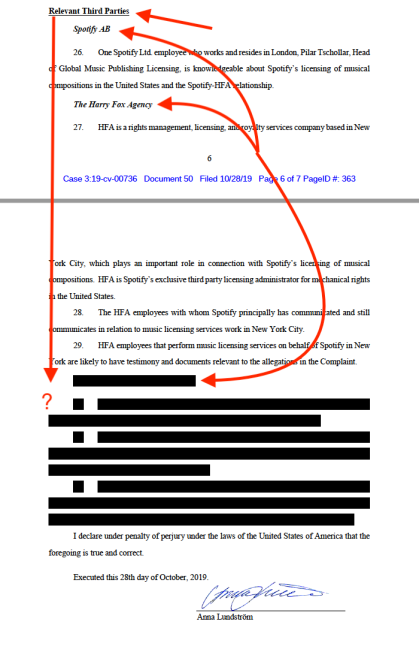“We never get accustomed to being less important to other people than they are to us.”
Holly Martins in The Third Man by Graham Greene
As MTP readers will recall (especially newsletter readers), Spotify is being sued in Nashville by the publishers of a good chunk of Eminem’s extremely popular catalogs (on albums each streamed over 1 billion times on Spotify according to the press). The lawsuit alleges that Spotify has failed to comply with the conditional (and highly controversial) reachback safe harbor under the Music Modernization Act’s Title I. The suit also challenges the reachback element of the Title I safe harbor giveaway as an unconstitutional “taking”. (The case is cited as Eight Mile Style, LLC and Martin Affiliated, LLC v. Spotify USA Inc., Civil Case No.3:19-cv-00736, U.S.D.C. Mid. Dist. Tenn., Nashville Div., Aug. 21, 2019. You can read the complaint here.)
In pre-answer pleadings, Spotify has filed a motion to dismiss for improper venue and has asked the Court to transfer the case to the Southern District of New York failing dismissal. (Spotify was also granted a pre-answer stay of discovery which makes even less sense.) This is because despite the fact that Spotify has a Nashville office and has spent considerable resources for a very long time on a charm offensive directed at Nashville songwriters, Spotify alleges that all of its music publishing licensing operations are in New York. That may be true, but that doesn’t mean that a Nashville jury should be denied the right to hear the case. It’s also unclear why it would be inconvenient for Spotify to be tried in Nashville.
Because the Internet.
But we’ll see. What was interesting about the Spotify motion to dismiss was that it is supported by an affidavit from a Spotify employee describing Spotify’s US mechanical licensing operations for songs. This affidavit was the normal sort of thing you’d see from a defendant trying to give the Court context about why the Court should transfer the case to somewhere else where the defendant was shopping…sorry…where the defendant was based.
And…like most Big Tech multinationals, especially public ones, Spotify wanted part of that affidavit “sealed”, meaning they wanted the Court to prohibit the public from being able to read part of it and most importantly no doubt, they wanted the plaintiffs from being able to speak about the sealed part. (Google especially likes that sealed business and has been successful employing that strategy.)
Crucially, this particular case involves critical issues of public policy that strongly militate against secrecy and in favor of complete transparency. The timing of this case is itself of critical importance as the Copyright Office is currently considering regulations to implement the very bare bones federal statute at issue in the case. The Constitutional issue presented alone is of the essence of Title I. Therefore, normal practice on sealing materials in this vitally important lawsuit should be balanced against strong legitimate public interest.
This is particularly true because the redaction appears to address how Spotify is handling mechanical royalties for thousands and potentially many, many more songwriters both in the U.S. and around the world, all of whom have a strong interest in Spotify’s processes and a right to know where there money is.
It might be important to remind everyone involved in the case that the eyes of the world are upon them and that the money involved is payable under a license they are compelled by law to grant. Therefore, all information relating to the payment of those monies should be made public. This case is different than your garden variety rate proceeding which is aspirational in nature. This case is brought because it appears that someone screwed up with the money.
And here’s what’s odd about the redaction. Although it must be said that reading tea leaves about redactions must be a cautious undertaking because there could always be an innocent explanation rather than artifice. (You can read the entire affidavit here.)
The affidavit lists some, perhaps all, of the current and former Spotify employees involved in mechanical licensing. We’re not focused on them right now. After that list comes a heading “Relevant Third Parties”.

Unsurprisingly, Spotify lists its parent company (Spotify AB) as a “Relevant Third Party”. While not “third party” in the normal sense, we can understand why the defendant would want to treat the parent as such as a legal fiction. Spotify also lists HFA, which is equally unsurprising as HFA has provided services to Spotify as Spotify’s agent for many years. (This may be a little confusing to songwriters who thought HFA just worked for them, but that’s a story for another day. For now, suffice it to say that HFA seems to be “on the wall” and works for both sides of the same transaction in some cases albeit providing different services in many cases.)
As an aside, HFA has been, I think, unfairly maligned in the press over its handling of Spotify’s mechanical licensing. I think this is very unfair and I have defended HFA against these attacks. At the end of the day, while HFA may have been the company’s agent, it was Spotify who decided to do what it did and Spotify alone should be held responsible. Criticizing HFA for Spotify’s decision is not only silly and petty in my view, I also think it’s just a bad reading of the law. Having said that, Eight Mile Style has made some serious allegations in its complaint and bears the burden of proving them up which may turn a different direction.
But back to the affidavit–observe the outline form of that redaction. The redaction covers three paragraphs in a separate heading under the affiants’ “Relevant Third Parties” bullet. The redaction aligns with both “Spotify AB” and “Harry Fox Agency” bullets above it. Whatever the redaction says, it appears to be describing a third entity that is neither Spotify AB nor HFA but providing third party services similar to both.

Maybe nothing but maybe something. If it is something, it appears to be an entity involved with handling songwriters money in yet a sixth lawsuit (including a class action) filed against the same company. One could easily make a compelling argument that this is a lawsuit filed against the very company that drove a major amendment to the licensing practice under the Copyright Act in the form of Title I originating with David Lowery’s and Melissa Ferrick’s class action against Spotify.
And it appears from both the compliant and the affidavit that not much has changed after the passing of the Music Modernization Act. If you look at all the cases against Spotify, they all have one thing in common. Spotify had many, many chances to settle the claim before it became a case. They either ignored the claims before they went legal, or didn’t take them seriously. Expensive oversight for the shareholders, but given Spotify’s governance by dual class voting stock, no surprise that the insiders’ moral hazard cuts against shareholders. Here, Spotify not only had an opportunity to avoid liability, they even amended the Copyright Act to provide themselves a lifeboat.
If something was fixed at Spotify by the MMA, please tell me because I’m missing it entirely. There does seem to be the strong possibility that unless something gets fixed at the company, the pattern will be full again very soon. Eight Mile Style’s attorney Richard Busch must have become something of a bête noire for Spotify–is this the fifth lawsuit against them or are there more? I’ve lost count. Removing the Eight Mile Style case to Timbuktu won’t change the attorney though. And even though it’s a stones throw from Spotify’s luxurious offices in World Trade Center, the SDNY just might be getting tired of seeing Daniel Ek’s smiling face in their chambers. Maybe not yet. But maybe they’d actually be better off staying in Nashville.
Someone should ask this question, so why not us–who is this mysterious third party who does Spotify’s mechanical royalty licensing or accounting that we are compelled to use by the statutory license?
How do they have their mitts on our money? And why so secretive?
[from https://ift.tt/2llz3cO]
No comments:
Post a Comment